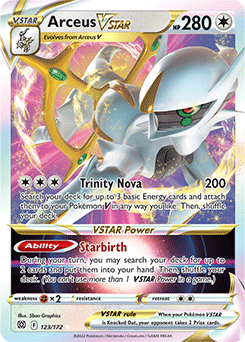Deep Diving into Arceus Dark Box from SLC Regionals
Finally! The first North American Regional Championships in two years is over! Following the stream and my friends’ successes in Salt Lake City was fun, and the format, as expected, proved slightly more diverse than it used to be. I’m sure no one expected four Gengar VMAX and zero Mew VMAX to finish in the Top 8! That said, after running into some failures with Mew myself, I wasn’t surprised to see it underperform. Mew was extremely popular at the event, but it’s quite inconsistent, and it also had the biggest target on its back. When Mew functions, it fires on all cylinders and is nearly impossible to beat, but it’s kept in check by its own inconsistency and by Darkness and Arceus VSTAR / Path to the Peak decks for now.

Anyway, the competitive circuit being finally back under way is extremely exciting! One deck that ended up with two Top 8 spots really jumped out at me, even before the tournament concluded: the Arceus VSTAR toolbox piloted by Ian Robb and Nicholas Moffit. These two veterans of competitive play brewed up what I believe to be the best Arceus variant in the format. I said before the tournament that if I was going and if I spent the time to prepare, I probably would have ended up making something along the same lines: Arceus alongside a toolbox of attackers that cover for weaknesses and threats. The two players who achieved Top 8 with it gave form to and perfected the idea that I envisioned, so I was happy to see their success.
The idea is that Arceus uses its Ability and attack to dominate the early game, while Galarian Moltres comes in to close things out with its insane late-game power. The Inteleon line provides unparalleled consistency, finding specific pieces when you need them and functioning as the deck’s glue. Galarian Zapdos V and Galarian Moltres V are matchup-specific techs. Zapdos covers the ever-common Fighting Weakness held by Gengar VMAX and opposing Arceus VSTAR, while Moltres V offers a strong early-game option against Mew VMAX.
Here’s the list that Nicholas Moffit used to make Top 4, which is one card different than Ian’s Top 8 list. I’ll go over the list and matchups, as well as possible improvements.
Pokemon
This is my favorite Arceus deck I’ve played so far. With any variant, I favor a heavy 4-3 Arceus line along with four Double Turbo Energy and two or three Choice Belt for consistency. This version is way greedier. It looks like it only uses the Arceus line as a tech, but it still goes for early Arceus in the same way any other Arceus deck does, though it’s a little less consistent at it. That said, unlike many other Arceus decks, it can still function without an early Arceus, which gives it a really interesting dynamic overall. This list plays the minimum amount of Arceus pieces necessary to actually use the card, and as a result, relies heavily on Starbirth to find its Double Turbo Energy.
In any case, Arceus plus a turn-one Energy attachment is the ideal scenario. However, there’s not always a good target for your Energy acceleration with Trinity Nova. In fact, in some matchups, you opt to keep your on-board two-Prize targets to a minimum. Between Inteleon and baby Moltres, you have plenty of single-Prize attackers once Arceus goes down, since Zapdos V and Moltres V are only situational techs. This helps you win the Prize trade in plenty of games.
The Inteleon line is nothing new, but this list even plays one Water Energy because Aqua Bullet is so valuable. After a hit from Trinity Nova, Aqua Bullet can finish off any Pokemon in the format. The second copy of Shady Dealings Inteleon gives us another one to work with if the first is sacrificed as an attacker, and it also makes up for playing fewer copies of Scoop Up Net.
Overall, the Pokemon lineup is as no-nonsense as it gets. Maximum Inteleon pieces for maximum consistency, and no excess techs or attacker lines whatsoever. Klara is a powerful recovery card, so it always feels like you have more than enough Pokemon and Energy anyway.
This concludes the public portion of this article.
If you'd like to continue reading, consider purchasing a PokeBeach premium membership! If you're not completely satisfied with your membership, you can request a full refund within 30 days.
Each week we post high-quality content from some of the game's top players. Our article program isn't a corporate operation, advertising front, or for-profit business. We set our prices so that we can pay the game's top players to write the best content for our subscribers. Each article topic is carefully selected, goes through multiple drafts, and is touched up by our editors. We take great pride in our program!

